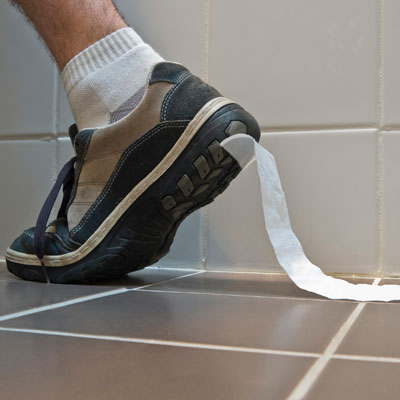No one likes to be the last to know about things that are socially embarrassing, and it can often very difficult to know if we are mishearing. But sometimes we get clues...
When everyone knows but you
None of us like the idea of others knowing things about us that even we don't know ourselves. Spinach stuck in our teeth... Toilet paper stuck to our shoe... Our zip undone... If we have bad breath... Mishearing.
And we also know how difficult it is to tell someone else that they've got bad breath, or their zip is undone, or they're mishearing. It's one of those socially awkward situations. Do we tell them, and risk embarrassing them? Or do we pretend it doesn't exist and hope it either resolves itself, or someone "more suited to the task" will tell them!
That means we've got to assume that everyone knows we're mishearing—except us.
Fortunately when it comes to mishearing, there are some clues that can point us and in the right direction.
Mishearing Clue #1

If you ask to repeat, check your hearing's complete.
Complete hearing means that our brains have access to all the individual parts of sound that make up speech – all the vowels and all the consonants.
If we ask to repeat it may be because someone is mumbling or because we're unfamiliar with their accent. But equally, it might be because our hearing range currently has some gaps in it.
We can't easily change the way someone speaks, but we can make sure that we're not the ones breaking the flow of conversation. How? By having our hearing routinely checked, just as we do our eyes and teeth.
Mishearing Clue #2

Noise interfering? Check how you're hearing.
Noise always makes listening more difficult, no matter how good our hearing. It takes more effort and more concentration.
But it becomes much harder if our own hearing is not properly juggling of all the different sounds. It needs to be able to connect each sound to where and what it's coming from. That way our brains know which sounds to focus on, and which ones to suppress.
It's not easy to avoid noise in the modern world, but we can make sure we know how we're hearing—by having our hearing professionally profiled.
Mishearing Clue #3

Raising the volume, raising the tension?
Watching television is still a shared activity for many of us, which means that we have to find a volume that's comfortable to all.
If the volume is too loud or too quiet for us, it increases our stress levels. Either we're blasted with too much sound, or we have to concentrate harder to make out what someone is saying or follow the plot. Often background music and accents makes this all the more difficult.
When different viewers prefer different volumes, someone is forced to compromise. Unless, of course, we're all having our hearing routinely checked.

Better to know before problems show
We're all in the same boat when it comes to mishearing. But these 3 clues could save us a lot of social embarrassment by acting as our own early warning signal.
Because as the saying goes, “It's better to know before problems show.” That way we can take the appropriate steps to prevent the consequences of mishearing—by keeping our hearing prepared, empowered and protected.
